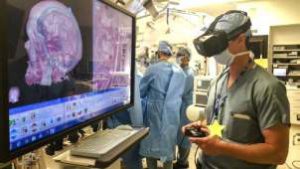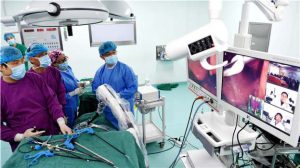The speed with which 5G is expected to connect everything around us to a network will be 20 times faster than our current wireless networks. This high speed will change everything around us.
 Ever since the mobile services were launched the mobile dynamics have changed a lot since 2002 when the MENA region accounted for just nineteen million mobile connections.
Ever since the mobile services were launched the mobile dynamics have changed a lot since 2002 when the MENA region accounted for just nineteen million mobile connections.
According to the figures available the region now has approximately 640 million SIM connections against 360 million unique mobile subscribers in the year 2002.
 Almost all the GCC nations have carried out host of activities to in the past few months trying to outdo each other and this making the competition in the 5G race severe.
Almost all the GCC nations have carried out host of activities to in the past few months trying to outdo each other and this making the competition in the 5G race severe.
The speed with which 5G is expected to connect everything around us to a network will be 20 times faster than our current wireless networks. This high speed will change everything around us.
The virtual and augmented reality will be even more attainable from our smart phones and thus giving users an out of the world experience. An alliance of speed and reach will further unfold the capabilities which we are just imagining of in the current world like: drone, self-driving cars and not to forger Internet of Things.
The 5G is also about enhanced capacity. This means Smart phones with 5G connectivity will give us a stronger signal in urban areas which are crowded. Thus more people and devices will be able to communicate at the same time. With GGC having traditionally high smart phone penetration rates this will be more than welcome. Just to refresh our memories the UAE has the highest smart phone penetration rates in the world and hunger for digital media.
Race for regional superiority:
If the facts are to be believed n Saudi Arabia the Ministry of Culture and Information (CITC) said that Al Khobar was the first city in the region to test a 5G network.
Chasing Saudis was Qatar, where Ooredoo which is an international telecommunications company headquartered in Doha said that it was offering the first commercially available 5G network in the world.
The company’s strong network has made 5G services available in major areas of the capital, Doha.
Ooredoo had ambitious plans of updating 100 network stations across Qatar with 5G capabilities. Seeing the success it later will expand its presence across 1,200 stations covering the whole country.
Not far behind was UAE when in the year 2018, the UAE telecom provider Etisalat also announced the launch of the first commercial 5G network across the country.
Becoming a 5G requires a lot of efforts and most of the operators and countries across the GCC region have actively started working on the road map in order to harness this infrastructure in the next coming years.
In the case of Saudi Arabia its telecom provider STC, has previously inked deals with Huawei and Nokia, the main reason behind this was to launch a 5G network in the kingdom this year.
One of the UAE-based telecoms providers DU, established the UAE 5G Innovation Gate (U5GIG).
 The 5G promises to transmit data at speeds of more than 1Gbps which will go a long way in meeting the Middle East regions love for mobile video and at the same time support the growing demand for connectivity which is needed in various other things.
The 5G promises to transmit data at speeds of more than 1Gbps which will go a long way in meeting the Middle East regions love for mobile video and at the same time support the growing demand for connectivity which is needed in various other things.
This was a consortium of technical and academic experts, as well as global telecom vendors in the year 2016.
The main reason behind DU’s strategy was to create 5G Innovation Lab to prototype, test, and validate early 5G services which will the telecom industry in the long run.
For any country which aspires of moving into the 5G arena, it’s important that it is spectrum ready and has 5G enabled equipment ready.
Another issue which is of importance is the cost of new networks is a further consideration for both the operators and governments.
If the facts are to be believed by the year 2035 5G will enable more than $12 trillion in global economic revenue, and is expected to create 22 million jobs worldwide.
By just looking at these figures it may be noted that expectations for 5G roll out are sky high and it seems to be a game changer it the telecom industry.
It can be clearly seen that many stakeholders are excited about the wide range of possibilities that 5G might unfold.
The 5G promises to transmit data at speeds of more than 1Gbps which will go a long way in meeting the Middle East regions love for mobile video and at the same time support the growing demand for connectivity which is needed in various other things.
How 5G will transform healthcare
5G promises to transform healthcare scenario by improving patient experience with personalized, preventative care. In most of the cases the only option once had when we became ill and needed medical attention was to travel to a doctor or hospital. For people in rural areas, with doctors located several miles away, traveling while ill can be challenging and time-consuming. With the advent of technology which led to tele health and remote home monitoring systems, though, we could receive care from the comfort of our homes. Doctors could make recommendations after a short video call, and even submit prescription requests. However, this remote monitoring, along with sophisticated imaging equipment, can lead to additional strain on the networks of businesses in the healthcare industry. This often increases congestion and slows network speeds, especially for healthcare providers that might be interfacing with dozens of patients a day. The lag is not only frustrating for those using it, but the poor quality can delay patient care, which could hurt outcomes in the long run. And because the use of Internet of Things (IoT) technologies continues to grow, the amount of data on networks is expected to only increase more. 5G technologies have the potential to help resolve these challenges.
















